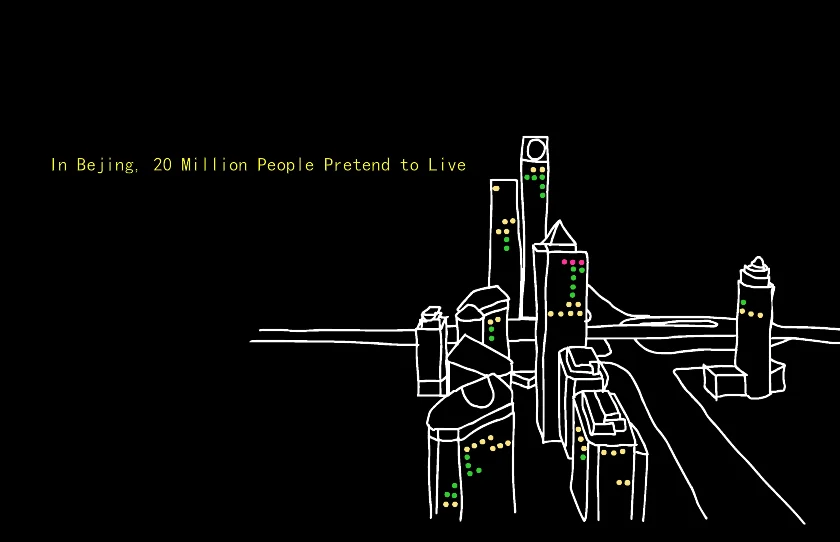Editor’s note: On July 23, the writer Zhang Wumao published an essay called “In Beijing, 20 Million People Pretend to Live” to his public WeChat account. As of the following morning, it had accumulated more than 5 million views and nearly 20,000 comments.
Of course, the article was removed that very afternoon.
But by then, the essay had attracted thousands of responses. As our correspondent Megan Pan wrote for Radii:
Though the hubbub online has died down, the essay, a meditation on varying facets of life in Beijing, has since spawned over a hundred thousand countering essays in response. Titles include plays on the original essay’s title, such as “In Beijing, 20 Million People and “In Beijing, 20 Million People are Bravely Living,” and even direct digs at the author, such as “Mr. Zhang, You Aren’t Even a Beijing Kid So Why Are You Acting Like a Know-it-all.” The original essay has been lambasted as “making a fuss over nothing.”
But “In Beijing, 20 Million People Pretend to Live” resists easy summarization – it’s framed as a series of Zhang’s loosely related reflections on living in Beijing, heavily supported by anecdotes. He touches on a variety of topics that hit close to home: the everyday absurdities of urban sprawl, the never-ending struggle to buy a house, and alienation from home. As a nonlocal from Shaanxi who has been living in Beijing for the past eleven years, he also attempts to negotiate the tensions and differences between locals and nonlocals.
What follows is Megan Pan’s translation of that now-censored essay.
在北京,有2000万人假装在生活
In Beijing, 20 Million People Pretend to Live
1
北京没有人情味.
Beijing has no human warmth.
经常被外地朋友批评:北京人钱多装逼不热情。都到了同一个城市,干嘛不一起聚聚?几十年的交情,还不把我送到机场?事实上,北京人很难像外地人一样热情——来去接送,全程陪同,北京人真的很难做得到。
I am often criticized by nonlocal friends: Beijingers have a lot of money and act unfriendly. We’ve all made it to the same city, why don’t we get together? A few decades of friendship, and you won’t even send me to the airport? In reality, it is hard for Beijingers to be as friendly as outsiders – picking up and dropping off, accompanying all the way, these things truly are hard for Beijingers to do.
北京人很忙,忙到晚上11点,还在三环路上堵着;北京社交时间成本真的太高,高到从石景山去通州吃饭,还不如去天津来得快;北京真的太大,大到根本就不像一个城市。
Beijingers are very busy, busy all the way until 11 o’clock at night, and even then they are still stuck in traffic on the Third Ring Road; the time cost of socializing in Beijing is too high, so high that it is faster to go to Tianjin than it is to go from Shijingshan to Tongzhou to eat; Beijing is really too big, so big that it isn’t like a city at all.
北京到底有多大?它相当于2.5个上海,8.4个深圳,15个香港,21个纽约,27个首尔。2006年,张先生来北京,地铁只有1号,2号,13号线,现在的北京地铁到底有多少条线,不用百度还真记不住。10年前我坐着公交去找工作,拒绝去四环外的公司面试。现在,京东、腾讯、百度这些大公司都在五环外。
How big is Beijing? It is equivalent to 2.5 Shanghais, 8.4 Shenzhens, 15 Hong Kongs, 21 New Yorks, and 27 Seouls. In 2006, when Mr. Zhang [referring to himself] came to Beijing, the subway only had Lines 1, 2, and 13; if I didn’t use Baidu, I really wouldn’t be able to remember just how many lines the Beijing subway has now. Ten years ago, I took the bus to look for work and refused to go beyond the Fourth Ring for job interviews. Now, big companies like JD, Tencent, and Baidu are all outside of the Fifth Ring.
外地朋友来了北京,以为我们就很近了,实际上咱们不在同一个城市,咱们可能是在若干个城市,它们是中国海淀,中国国贸,中国通州,中国石景山……如果以时间为尺度,通州人和石景山人谈恋爱就算是异地恋,从北五环来趟亦庄就可以说是出差。
When nonlocal friends came to Beijing, they thought we were closer, but we weren’t actually in the same city, we may have been in a number of cities: they are Haidian, China; Guomao, China; Tongzhou, China; Shijingshan, China… If we use time as a measure, then someone from Tongzhou dating someone from Shijingshan would count as long-distance, and going from North Fifth Ring to Yizhuang can be called a business trip.
十年间,北京一直在控房控车控人口,但这块大饼却越摊越大,以至于西安的同学给我打电话,也说自己在北京,我问他在北京哪里?他说:我在北京十三环。
For the last ten years, Beijing has been controlling housing, controlling cars, and controlling population, but this large flatbread continues to sprawl and grow larger, to the point where my Xi’an classmate called me and said he was also in Beijing, and when I asked where in Beijing he was, he said: I’m in Beijing’s Thirteenth Ring.
北京是个肿瘤,没有人能控制它的发展速度;北京是一条河流,没人能划清它的边界。北京是一个信徒,只有雄安能将它超度。
Beijing is a tumor, whose speed of development no one can control; Beijing is a river, whose boundaries no one can draw. Beijing is a disciple, and only Xiongan can release it from purgatory. [Editor’s note: Xiongan is a recently established state-level development hub in nearby Hebei province.]
北京的人情淡薄不只是针对外地朋友,对同处一城的北京朋友同样适用。每次有外地同学来京,聚会时外地同学会说,你们在北京的应该经常聚吧?我说,你们一年来几次北京,我们差不多就聚几次。
Beijing’s coldness is directed not only at nonlocal friends, it is also similarly applied to Beijing friends who live in the same city. Every time a nonlocal classmate comes to Beijing, when we all get together the classmate will say, you guys in Beijing often meet up, right? And I will say, however many times you guys come to Beijing is about how many times we meet up.
在北京,交换过名片就算认识;一年能打几个电话就算至交;如果还有人愿意从城东跑到城西,和你吃一顿不谈事的饭,就可以说是生死之交了;至于那些天天见面,天天聚在一起吃午饭的,只能是同事。
In Beijing, exchanging business cards counts as recognition; calling a couple times a year counts as best friends; if someone is willing to go from the east to the west side to have a meal with you without talking business, then you could be called friends for life; as for the people you see every day, eat lunch with every day, they are only coworkers.
2
北京其实是外地人的北京。
Beijing is actually the outsider’s Beijing.
如果要让中国人评选一生中必去的城市,我相信大多数人会选择北京。因为这里是首都,这里有天安门,有故宫,有长城,有几百家大大小小的剧院。话剧歌剧传统戏,相声小品二人转,不管你是阳春白雪,还是下里巴人,都可以在北京找到属于自己的精神食粮。但这些东西其实和北京的人没多大关系。
If you let Chinese choose their must-go cities in this lifetime, I believe that most people would pick Beijing. Because here is the capital, here is Tiananmen, the Forbidden City, the Great Wall, the hundreds of theaters, big and small. Drama, opera, traditional drama, crosstalk, two-person skits, whether you like highbrow or popular art, you can always find what your spirit needs in Beijing. But these things actually do not have much to do with Beijingers.
走进北京各大剧院,十个人里面有六个人是口音各异的外地人,还有三个是刚来北京,没新鲜够的文艺青年,最后剩下一个是坐在角落里刷手机,熬时间的北京地陪。
Walking into Beijing’s various big theaters, I see that among ten people, six are outsiders with differing accents, three are young literary types that have just arrived in Beijing and haven’t gotten enough of the novelty, and the last remaining one is the local guide sitting in the corner, playing with his phone to kill time.
来京11年,我去过11次长城,12次故宫,9次颐和园,20次鸟巢。我对这个城市牛逼的建筑,悠久的历史完全无感。登上长城,只会想起孟姜女,很难再升腾起世界奇迹的民族豪情;走进故宫,看到的只是一个接一个的空房子,还没我老家的猪圈生动有趣。
In the 11 years since arriving in Beijing, I have gone to the Great Wall 11 times, the Forbidden City 12 times, the Summer Palace nine times, and the Bird’s Nest 20 times. I feel complete indifference for this city’s awesome structures and long history. Climbing the Great Wall, I only think of Lady Meng Jiang, finding it difficult to stir up that lofty pride for the wonders of the world once more; walking into the Forbidden Palace, I see only one empty building after another, which is even less lively and interesting than my hometown’s pigpen.
[Lady Meng Jiang, according to folklore, wept bitterly at the Great Wall for her dead husband, who helped build it.]
很多人一提北京,首先想到的是故宫后海798,是有历史有文化有高楼大厦。这些东西好不好?好!自豪不自豪?自豪!但这些东西不能当饭吃。北京人感受更深的是拥堵雾霾高房价,是出门不能动弹,在家不能呼吸。
When bringing up Beijing, so many people think first of the Forbidden City, Houhai, and 798 [Art Zone], of how Beijing has history and culture and high-rises. Are these things good? They are good! Am I proud? I am proud! But these things cannot be what we live off. What Beijingers experience more deeply is the congestion, the smog, the high housing prices; it is how, when leaving the house, you cannot move, and when at home, you cannot breathe.
3
北京是终归是北京人的北京。
Beijing, in the end, is the Beijingers’ Beijing.
如果说北京还有那么一点烟火味的话,那么这烟火味属于那些祖孙三代都居住在这个城市的老北京人。这烟火味是从老北京人的鸟笼子里钻出来的,是从晚饭后那气定神闲的芭蕉扇里扇出来的,是从出租车司机那傲慢的腔调里扯出来的……
If Beijing is said to have that hint of the smell of smoke, then that smell of smoke belongs to the old Beijingers who have been living in this city for generations. This smell of smoke curls out of old Beijingers’ birdcages, fans out from the leisurely palm-leaf fan after dinner, is pulled out from the taxi driver’s haughty tone of voice…
老北京人正在努力为这个城市保留一丝生活气息,让这个城市看起来,像是个人类居住的地方。
Old Beijingers are currently trying to preserve a bit of breath of life for this city, in order to make this city look like a place where humans live.
老北京人的这点生活气息是从基因里传下来的,也是从屁股下面五套房子里升腾起来的。当西城的金融白领沉浸在年终奖的亢奋中时,南城的北京土豪会气定神闲地说,我有五套房;当海淀的码农们敲完一串代码,看着奶茶的照片,幻想自己成为下一个刘强东的时候,南城的北京土豪会气定神闲地说,我有五套房;当朝阳的传媒精英签完一个大单,站在CBD落地窗前展望人生时,依旧会听到南城土豪气定神闲地说,我有五套房。
This breath of life that old Beijingers have is passed down through genes, and also rises up from the five houses underneath their asses. When Xicheng’s [Beijing district to the west] financial white-collars are absorbed in the excitement of their year-end bonuses, Nancheng’s [district to the south] Beijing tuhao [Chinese term for people of wealth/nouveau riche] will leisurely say, I have five houses; when Haidian’s manong [coders] finish typing out a string of code, looking at pictures of milk tea* and fantasizing about when they will become a Richard Liu [founder of JD.com], Nancheng’s Beijing tuhao will leisurely say, I have five houses; when Chaoyang [District]’s media elite finish signing a large order, standing in front of the CBD’s [Central Business District] floor-to-ceiling windows forecasting life, they will still hear Nancheng’s tuhao leisurely saying, I have five houses.
* [“Milk tea” is a reference to JD.com founder Richard Liu’s wife, Zhang Zetian, whose nickname is “milk tea sister.”]
没有五套房,你凭什么气定神闲?凭什么感受生活气息?凭什么像北京大爷一样逗鸟下棋,听戏喝茶?
If you don’t have five houses, on what basis can you act leisurely? On what basis can you feel that breath of life? On what basis can you be like an old Beijing uncle, playing with birds, playing chess, listening to operas, and drinking tea?
在北京,没有祖产的移民一代,注定一辈子要困在房子里。十几年奋斗买一套鸟笼子大小的首套房;再花十几年奋斗换一套大一点的二套房,如果发展得快,恭喜你,可以考虑学区房了。
In Beijing, this generation of migrants without inherited property are destined to be trapped within the housing system their whole lives. They struggle for decades to buy a house the size of a birdcage, then struggle a few more decades to swap it out for a slightly bigger second house, and if you make strides, congratulations, you can now consider school district housing.
好像有了学区房,孩子就可以上清华上北大,但是清华北大毕业的孩子依旧买不起房。那时候,孩子要么跟我们一起挤在破旧的老房子里,要么从头开始,奋斗一套房。
It is as though if you have school district housing, your kids will be able to go to Tsinghua and Peking University, but kids that graduate from Tsinghua and Peking still can’t afford to buy a house. Then, they will come live with us in that shabby old house, or start all over again, struggling to buy a house.
4
2015年,电影《老炮儿》热映,朋友圈里有好多人吐槽电影里六爷的北京味。我深有感触。
In 2015, Mr. Six was popular in theaters, and on my Wechat Moments were many people complaining about Mr. Six’s Beijing flavor. I felt very much the same way.
来北京十多年,我拒绝去五棵松看首钢,拒绝去工体看国安,因为没有发自肺腑的热爱,也学不会京腔国骂。但在北京久了,你会和老北京人达成某种和解。对他们有了更立体的了解,就没法再把他们简单地标签化。
Having been in Beijing for 10 or so years, I refuse to go to Wukesong to see the Beijing Ducks [basketball team] and to go to the Workers’ Stadium to see Beijing Guoan [soccer team], as I have no love for it from the bottom of my heart and I can’t learn Beijing-style cursing. But if you stay in Beijing for a while, you will reach a kind of understanding with the old Beijingers. Once you have a richer understanding of them, there is no way to stereotype them.
事实上,不是所有的北京人都排外,我身边就有很多友好的北京土著;也不是所有的北京年轻人都不求上进,坐享其成,大部分的北京年轻人和我们一样勤奋。
In reality, not all Beijingers oppose outsiders, many of my friends are Beijing natives themselves, and not all young Beijingers are idle and only enjoy what they already have. Most young Beijingers are just as assiduous as we are.
你可以不喜欢《老炮儿》,不喜欢北京人的自大京骂吹牛逼,但你得尊重他们,就像尊重东北人戴金项链,尊重山东人吃大葱一样,这就是人家的文化和习性,不能入乡随俗,至少也得敬而远之。
You can dislike Mr. Six, dislike Beijingers’ swaggering style of cursing and bragging, but you must respect them, just like you respect Dongbei [northeastern] people wearing gold chains and Shandong people eating scallions. These are people’s culture and habits, and if you can’t do as the Romans do, you must at least respect them from a distance.
有一次打车去林萃路,怕师傅不认识路,我打开导航准备帮师傅找路。师傅说不用导航了,那地方我知道,30年前那里是个面粉厂,十年前面粉厂拆了,建成了保障房。我说,你咋这么清楚?师傅满脸忧愁地说,那是我老家。
The first time I took a taxi to Lincui Road, I was worried the taxi driver wouldn’t know the way, so I opened up my navigation app to help guide him. The driver said he didn’t need it, I know that place, 30 years ago it was a flour factory, 10 years ago the flour factory was torn down and turned into affordable housing. I said, how do you know so much? With a face full of sorrow, the driver said, That was my old home.
我从师傅的话里能听出一丝乡愁和怨恨,北京对于新移民是站不住的远方;对老北京人却是回不去的故乡。
I could hear in his words a hint of nostalgia and resentment; to new migrants, Beijing is the distant place where they cannot stay, to old Beijingers, it is the home to where they cannot return.
我们这些外来人一边吐槽北京,一边怀念故乡。事实上,我们的故乡还回得去。它依旧存在,只是日益落败,我们已经无法适应而已。但对于老北京人而言,他们的故乡才是真的回不去了,他们的故乡正在以前所未有的速度发生物理上的改变,我们还能找到爷爷当年的房子,但多数北京人,只能通过地球经纬度来寻找自己的故乡。
We outsiders complain about Beijing while missing our homes. In reality, we can still go back to our homes. They still exist, it is only that they fall increasingly behind day by day and we cannot adjust anymore. But for old Beijingers, they truly cannot go back to their home, their home is now undergoing a physical change at an unprecedented speed. We can still find grandpa’s house from back then, but many Beijingers can only search for their own home by the earth’s coordinates.
有人说,是我们外地人建设了北京,没有外地人北京人连早餐都吃不上;是因为大量的外来人口抬高了北京的房价,造就了北京的繁华。但是你想过没有?老北京人也许并不需要这繁华,也不需要我们来抬高房价,他们和我们一样,只需要一个说青水秀,车少人稀的故乡。
Some people say, it is we outsiders who built up Beijing, if there were no outsiders, Beijingers wouldn’t even be able to have breakfast; it is because the migrant population has raised Beijing’s housing prices, creating Beijing’s prosperity. But have you ever thought about it? Perhaps old Beijingers don’t need this prosperity and don’t need us to raise housing prices. They are just like us, only needing a home with idyllic scenery, with few cars and less people.
5
今年,北京核心城区开始治理开墙打洞,越来越多的小商店、小饭店、小旅馆被迫关门,越来越多低端行业的从业者被迫离开,这种脱衣服减肥的管理方式让北京在高大上的道路上一路狂奔,但它离生活便利的宜居之都却越来越远,离包容开放的城市精神越来越远。
This year, Beijing’s core city area has begun to clean up “holes in the wall.” More and more small shops, restaurants, and hotels are being forced to close, more and more people working in low-end sectors are being forced to leave. This kind of shed-clothing-to-lose-weight style of management has allowed Beijing to hurtle down the road to sophistication, but it draws further away from the livable city, further away from the open and inclusive spirit of the city.
那些追梦成功的人正在逃离,他们去了澳洲,新西兰,加拿大,美国西海岸。那些追梦无望的人也在逃离,他们退回到河北,东北和故乡。
Those who have successfully achieved their dreams are currently fleeing to Australia, New Zealand, Canada, and the west coast of America. Those who have chased their dreams in vain are also fleeing, they are returning to Hebei, Dongbei, and their hometowns.
还剩下2000多万人留在这个城市,假装在生活。事实上,这座城市根本就没有生活。这里只有少数人的梦想和多数人的工作。
And in this city remain 20 million people, pretending to live. In reality, there is no life in this city. Here, there are only the dreams of few and the work of many.
~
Megan Pan is a writer and undergraduate at Northwestern University majoring in Philosophy and double-minoring in Poetry and Chinese.



